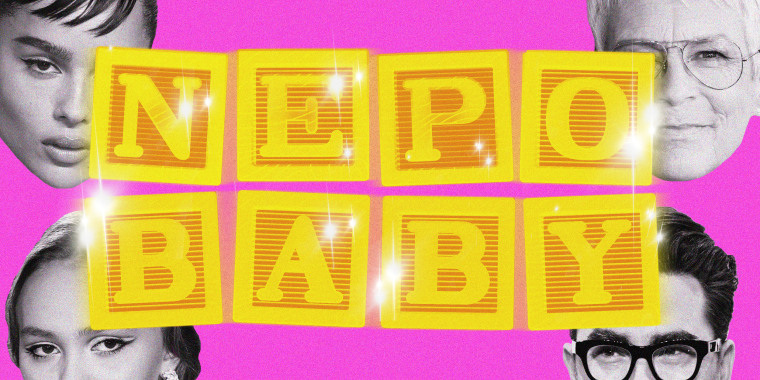2022 was the year of the “nepo baby” — and the aforementioned babies ended the year big mad about it.
Lottie Moss (half-sister of supermodel Kate Moss) is “sick of people blaming nepotism for why they aren’t rich and famous or successful.” Lily Allen (daughter of actor Keith Allen and producer Alison Owen) thinks you should be worried about the really problematic nepo babies — you know, the ones in industries that don’t include hers. The term made Maude Apatow (daughter of director Judd Apatow and actor Leslie Mann) “sad” and Zoe Kravitz (daughter of actor Lisa Bonet and musician Lenny Kravitz) deeply “insecure.” Lily Rose-Depp (daughter of actor Johnny Depp and model Vanessa Paradis) thinks it just “doesn’t make any sense.”
Even Jamie Lee Curtis (daughter of actors Tony Curtis and Janet Leigh) joined the defensive discourse, declaring she is proud of her movie star “lineage.”
Even Jamie Lee Curtis (daughter of actors Tony Curtis and Janet Leigh) joined the defensive discourse, declaring she is proud of her movie star “lineage.” The current discussion about nepo babies is simply “designed to try to diminish and denigrate and hurt,” the Hollywood icon said.
As often happens, these responses were just as revealing — if not more so — than the discourse that elicited them. Celebrity defensiveness highlights the gulf between the most visibly privileged and the rest of us. But it also is a reminder that many of those relatively lucky few still do not understand how privilege actually works, or are simply unwilling to do the uncomfortable work of acknowledging it.
For the uninitiated, “nepo baby” (short for nepotism baby), is internet parlance for “the child of a celebrity or otherwise professionally connected person.” Most often, this term is used as shorthand for pointing to unequal access and opportunity within the entertainment industry specifically, but it can also be deployed when discussing professional sports, modeling, media and the fine arts.
On Dec. 19, Vulture published a comprehensive editorial package exploring the rise of the term, its cultural resonance and why a phenomenon that is decidedly not new — connections help you get ahead! privilege begets privilege! — came to a head in 2022. The package was anchored by Nate Jones’ essay “How a Nepo Baby Is Born.”
“How could two little words cause so much conflict?” asked Jones. “A baby is a bundle of joy; a nepo baby is physical proof that meritocracy is a lie. We love them, we hate them, we disrespect them, we’re obsessed with them.”
On some level, I understand the innate defensiveness that these nepo babies feel. After all, we live in a country obsessed with the myth of the American Dream, a core part of which is the idea that we are all self-made, pulling ourselves up by our bootstraps. Of course, this dream is fundamentally a scam. Privilege of different kinds has literally always dictated cultural and socioeconomic capital, especially in the United States. (See: American slavery.) But it is always uncomfortable to be made a symbol of an unequal system, especially when that system is so wide-reaching. (“I’ve never really turned to my dad for anything, I think out of fear of the label of nepotism,” Dan Levy, the "Schitt’s Creek" creator and star, told Page Six back in 2018 about his father, Eugene Levy.) And I have certainly witnessed nepotism operate in decidedly noncelebrity workplaces.
I also sympathize with celebrities who feel like they can’t win. We demand so much from these nepo babies, especially if they are the spawn of truly famous parents. We photograph them from infancy. We breathlessly consume articles with headlines like “Lily-Rose Depp and Model Mom Vanessa Paradis Are Practically Twins — See Their Look-Alike Style!” and “Reese Witherspoon’s Look-Alike Daughter Ava Flaunts Tattoos on Red Carpet,” and “8 celebrities with lookalike daughters following in their footsteps.” We act as though we deserve unprecedented access to these people, simply by virtue of their birth. It is the social contract of fame.
Putting aside the potential downsides of stardom, we desperately need more societal transparency about privilege, not less.
But putting aside the potential downsides of stardom, we desperately need more societal transparency about privilege, not less. Watching the collective nepo baby meltdown from the outside is like watching a white woman whose grandparents benefited from the G.I. Bill rail against government assistance. Of course professional connections matter. Of course famous names matter. To demure or assert otherwise only confirms what makes us have collective disdain for nepo babies in the first place. It says, quite simply, that they are devastatingly out of touch.
Building paths to success where there were previously closed doors cannot happen if we reinforce the collective delusion that everyone is born with equal opportunity. Making real progress toward equality requires first recognizing the shortcuts that many are given access to. That’s not a narrative that historically makes the rich and powerful feel warm and fuzzy inside. But for supposedly progressive stars like Curtis, it’s an uncomfortable — and necessary — truth.
Stars like Curtis probably should take a cue from actress Allison Williams, daughter of the journalist Brian Williams, and acknowledge their privilege (nepo or otherwise) head on.
“It doesn’t feel like a loss to admit it,” she recently told Wired when asked about nepotism. “If you trust your own skill, I think it becomes very simple to acknowledge.”
And that, nepo babies, is how it’s done.

